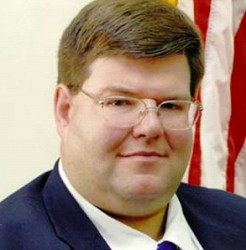The United States has been quietly clamping down on television piracy in Guyana, even as it has promised the Caribbean to help probe similar intellectual property and copyright violations by American companies.
“US industry has raised its concerns over the piracy of television programmes and had in fact had a team here, earlier this year, to look at that question and resolve the piracy of a particular television station,” outgoing Deputy Director of Mission Bryan Hunt told Stabroek News in an interview.
Most television stations in Guyana broadcast American content including news and current affairs programmes, movies and music including from DVDs.
A number of Guyanese have also named their businesses after well-known American companies although they have no affiliation.
Although there have been many calls from local artists, writers and business owners for updated copyright laws, as they feel it is key to the country’s development, Guyana still has no modern legislation.

Back in 1999, then president Bharrat Jagdeo had said that updated copyright laws were key to the country’s development and had stated that he intended to have a draft bill, in circulation at the time, in place by the following year. However, 17 years later it still has not materialized.
The People’s Progressive Party/Civic government also came in for withering criticism back in late 2012, under the leadership of former President Donald Ramotar, for seeking to procure pirated textbooks for use in public schools. The then government had sought to procure photocopied books for its school distribution programme. A number of local distributors were thereafter blocked by a High Court injunction from displaying, selling or producing photocopied books. The injunction secured by the United Kingdom’s Publishers Association was later discharged.
“We are always concerned about theft of intellectual property, in whatever country it occurs,” the American envoy asserted.
Reference was made to a Sheriff Street pizzeria named after a popular US pizza franchise. The local business establishment has since been renamed.
The US envoy also informed that officials from his country were here earlier this year, over complaints that a local television station was airing pirated material.
“From the reports I got they were able to come to successful agreements, with those that were not paying the appropriate fees for the transmission of that particular station, within Guyana,” Hunt said.
“That issue has been resolved but there are certainly instances here, in terms of pirated DVDs, in terms of pirated books, in terms of television broadcast which are not duly licensed and paid for and all of these are things that are going to need to be addressed,” he added.
The US diplomat pointed out that his country generally approaches the issue by trying to work with the Caribbean Community as a whole, on these issues.
Hunt explained, “The discussion on intellectual property and intellectual property rights and theft was a prominent part of the discussion, within the trade and investment council, we just had between the United States and Caricom in Washington…We did in fact come to some degree of understanding of what we can do, on a technical level, to try to strengthen Caricom’s ability to strengthen the various international agreements. Of this, TRIPS [agreement on Trade-Related aspects of Intellectual Property Rights] is the most prominent. The member states of Caricom are certainly aware of the importance of acting expeditiously, in order to stop piracy and intellectual property rights theft that is happening within their borders.
“They are certainly aware of the detrimental effects it has on their own economies, their own performing arts industries, and certainly from the United States side we are prepared to provide technical assistance …and as we promised the Caricom Secretariat, if they ever had instances where they believe that intellectual property theft was happening in the United States, we would be more than happy to investigate on their behalf and we hope that they would do the same, when things happen that violate the rights of US rights’ holders,” he added.









